
The 2022 "Global Summer School of Beijing Normal University: Love and Humanism in Chinese Culture," held by Phoenix School from July 27 to 29, came to a successful end. This program aims at building a new platform for communication between young scholars, home and abroad, to promote a deeper understanding of the essence of Chinese culture, thus broadening their research horizons and enhancing their academic levels. Moreover, it is also considered to be a pivotal attempt for Phoenix School to actively open up international education and promote the internationalization of the campus.
With "Love and Humanism in Chinese Culture" as its theme, the program invited six renowned experts in Chinese to talk about the core philosophical concepts of love and humanism mentioned in different historical periods and by different schools in traditional Chinese culture, such as Confucianism, Buddhism and Taoism. The experts invited were from Germany, the United States, India and Slovenia, respectively. The program attracted eighty-five graduate and undergraduate students from the United States, the United Kingdom, Canada, New Zealand, Singapore, Vietnam, and 24 leading institutions in China, including some students from top international schools such as Harvard University, New York University, University College London, University of Toronto, Peking University, and the Chinese University of Hong Kong. The program was hosted by Dr. David Bartosch, a Distinguished Research Fellow at the Institute for Advanced Study in Humanities and Social Sciences, Beijing Normal University at Zhuhai.
On the evening of the 27th, Professor Gu Bin, a world-renowned sinologist, German translator, author and philosophical poet, gave a lecture on "Coming to Terms of Love and Humanism in China," where he explained the different connotations of "love" in Chinese and Western cultures. According to Professor Gu Bin, the key meaning of "love" in traditional Chinese culture is "taking care," which means to care for a person. Then, he analyzed the differences and communication barriers between the two sexes in China and abroad through numerous literary cases.

The second guest speaker was Ananta Kumar Giri, Professor at the Institute of Development Studies, Madras, India. Being a leading sociologist and anthropologist in India, he presented a lecture themed "Love, Learning and Humanism in Chinese Culture and the Calling of Planetary Realizations: Confucianism, Vedanta and Beyond," in which he explored the concepts of love and humanism in Chinese Confucianism and Indian Vedanta, and how to deepen the understanding of them through dialogue between Chinese culture and other movements of thought and existence, such as Vedanta in the Indian tradition.
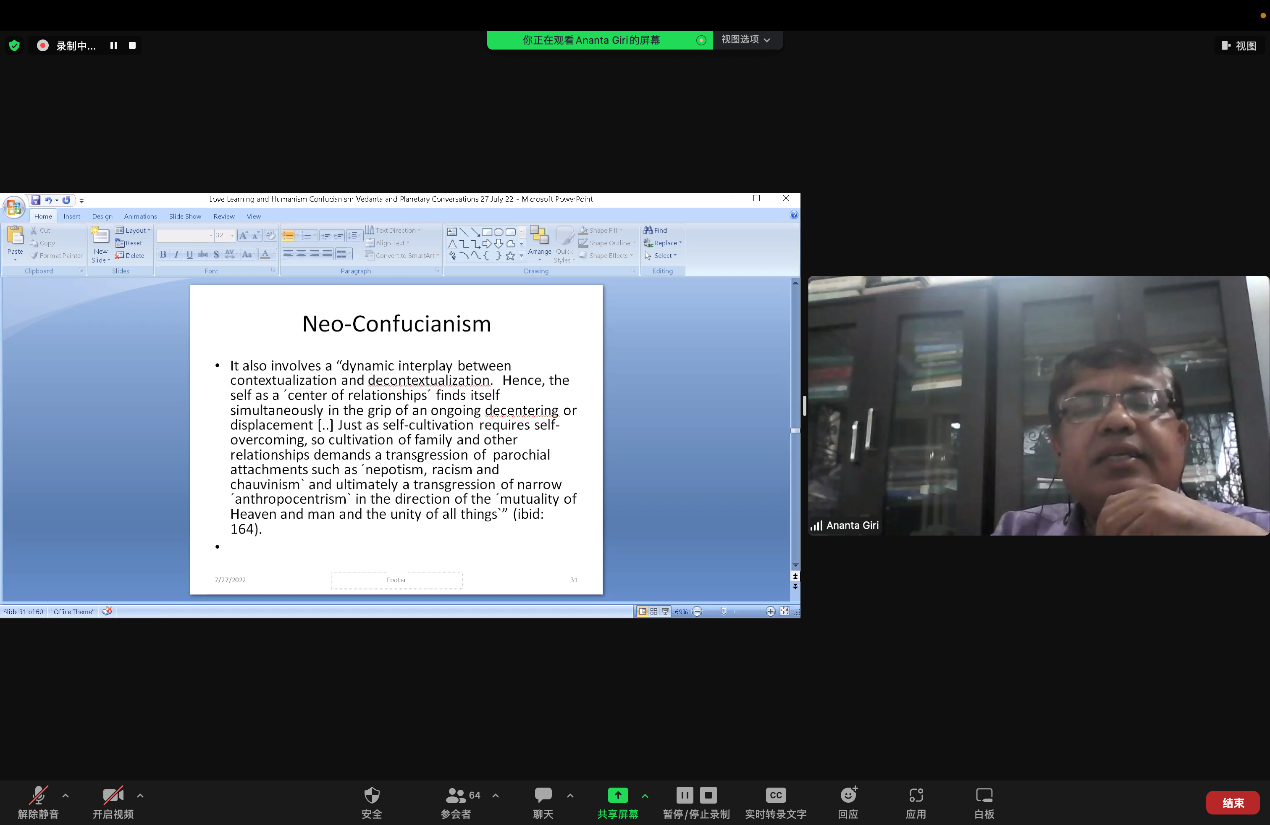
On the evening of the 28th, Professor Jana Rošker, a world-renowned sinologist, the co-founder and head of the Department of Asian Studies at the University of Ljubljana, Slovenia, gave a lecture with the theme of "Homo Mensura and the Alternative of Chinese Humanism." In her lecture, Prof. Rošker emphasized the importance and necessity of preserving and developing the paradigm of autonomy, liberal subjectivity and interpersonal solidarity that are fundamental values of European humanism. Furthermore, she pointed out that Chinese humanism could be a possible alternative model that can be integrated into a new framework of global humanist and post-humanist discourse.
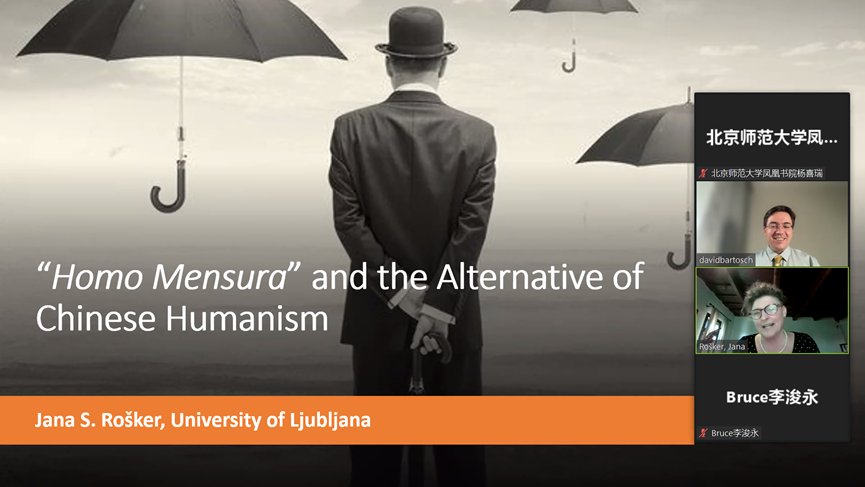
The next guest speaker of the day was Professor Robert LaFleur, an American anthropologist, historian, and leading expert on Chinese literature who serves as chair of the George Russell Collis Department of History at Beloit College in Wisconsin. With the theme of "Love in the Shadow of Ancient Hillsides,” his lecture focused on love stories in the The Book of Songs and examined them through the lens of French social theorist Marcel Grant (1884 -1940), who elaborately portrayed the important ancient festivities, the social and family atmosphere, and the impact of them on young people's love and marriages. Therefore, Professor LaFleur provided an in-depth analysis of some of the key works in The Book of Songs examined by Grant, and examined these love themes from several perspectives in other important works of Chinese history and literature.

On the evening of the 29th, the first guest speaker was Professor Holger Briel, Dean of Division of Culture and Creativity at Beijing Normal University-Hong Kong Baptist University United International College. In his lecture entitled "Love in recent Chinese Science Fiction," based on numerous science fiction works, Professor Briel analyzed the reasons for the sensation of science fiction in China and abroad in recent years and discussed the importance of the concept of love in Chinese science fiction. He holds the belief that science fiction will make a greater impact on contemporary Chinese society.
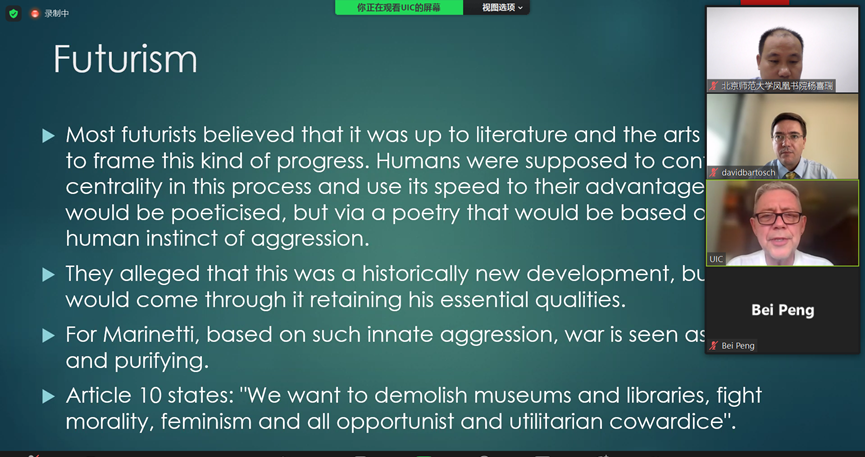
The last guest speaker was David Bartosch, a Distinguished Research Fellow of the Institute for Advanced Studies in Humanities and Social Sciences at Beijing Normal University at Zhuhai. In his course entitled "Universal Love and Humanism in Chinese Philosophy and Beyond," he focused on the philosophical ideas and perspectives of Zhu Xi and Wang Yangming, and further analyzed the different approaches of different schools of thought on "universal love" and "universal humanism," and their implications for the traditional culture of other countries and the future development of humanity in a cross-cultural context.
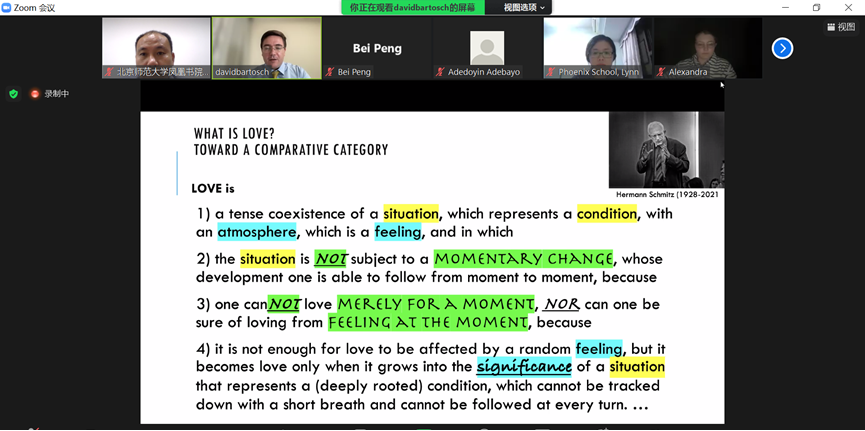
In short, in the program, young scholars from China and abroad exchanged ideas from different perspectives on the theme of "Love and Humanism in Chinese Culture" in a multicultural context, bringing them closer together and broadening their horizons. Mr. Yang Xirui, the director of the program at Phoenix School, attended the closing ceremony. On behalf of Phoenix School, Zhang Ling, Assistant to the Dean, expressed her gratitude to David Bartosch, the Distinguished Research Fellow, other guest lecturers and all members of the program group. Zhang Ling emphasized that Phoenix School will actively organize high-quality international course resources, enrich the course contents and continue to develop international course programs at a high level to form Phoenix School's brand characteristics and implement the strategic deployment of the internationalization of BNU Zhuhai.
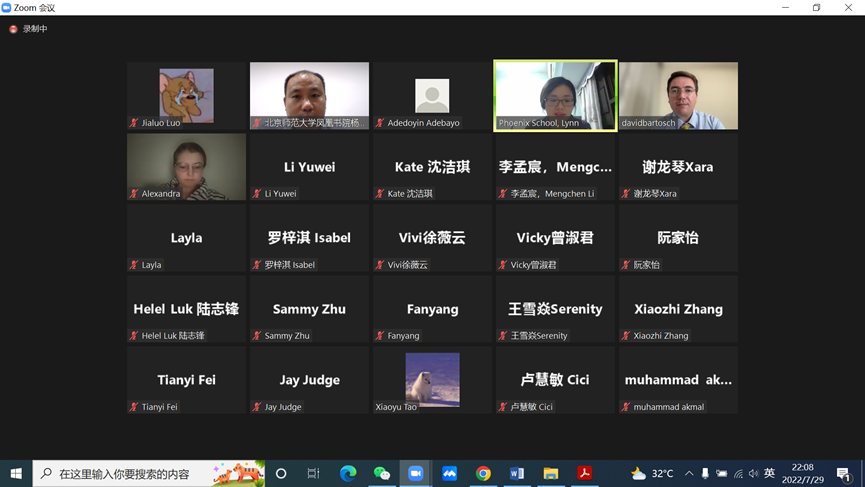
Translator: Xu Yifan
Proofreading: Martin Wittenberg